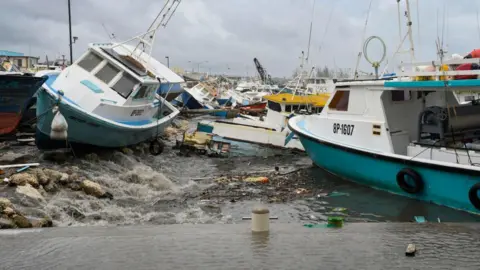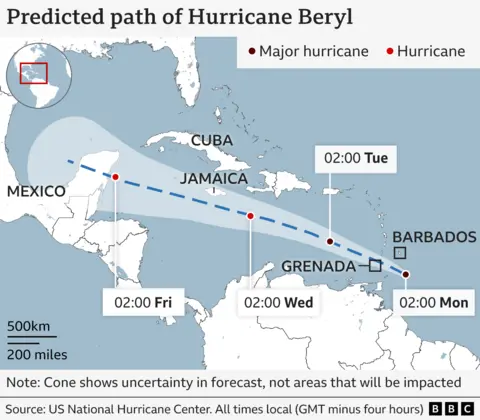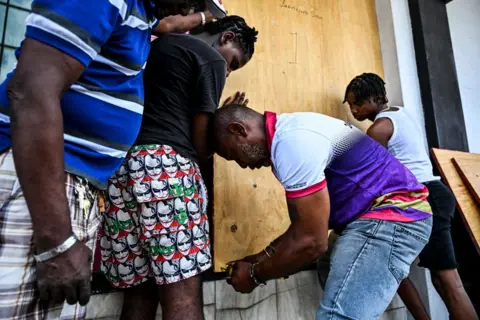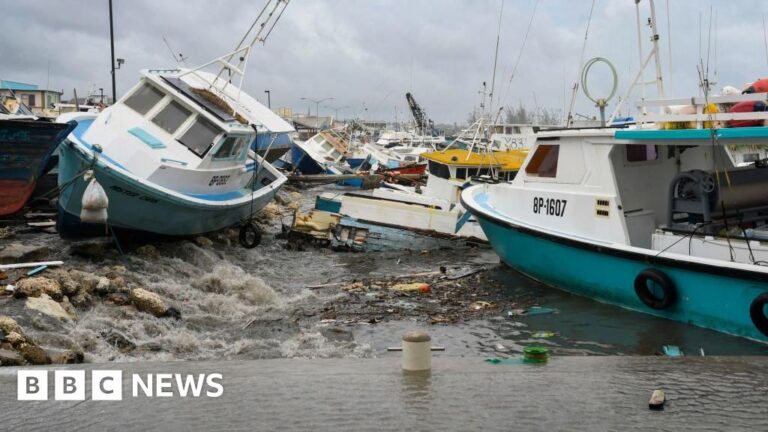By Will he grant, Correspondent for Central America and the Caribbean • Vanessa Buschschlüter, BBC News
At least one person has died after Hurricane Beryl made landfall in several Caribbean countries.
Thousands of people remain without power or are living in temporary shelters in Saint Vincent and the Grenadines, Grenada and Saint Lucia.
The hurricane has been upgraded to Category 5 and is moving west toward Jamaica. It is expected to hit southeastern Mexico by the end of the week.
Images on social media showed houses with their roofs torn off and residents digging through the rubble to save their belongings.
After Hurricane Beryl made landfall on the island of Carriacou in Grenada, it became clear that several areas of the Caribbean along its path had been hit hard.
“In half an hour, Carriacou was razed to the ground,” said Grenada Prime Minister Dickon Mitchell.
Meanwhile, Ralph Gonsalves, Prime Minister of St. Vincent and the Grenadines, said one person had died and there could be more deaths.
Earlier, airports and businesses had been closed and residents were urged to seek shelter as the storm approached.
 Getty Images
Getty Images“We’re not out of the woods yet”
At a news conference Monday, Mitchell warned: “We’re not out of the woods yet.” Grenada has also experienced several power outages, affecting communications and access to government updates.
According to the latest NHC update, the hurricane’s maximum sustained winds are near 150 mph (241 km/h) as the storm moves westward.
A hurricane watch is in effect for Jamaica, meaning the region is likely to experience hurricane conditions by Wednesday.
“This is not a joke,” said St. Vincent and the Grenadines Prime Minister Ralph Gonsalves, reminding people of the devastation caused by past hurricanes.
In a national address from his official residence, Mr Gonsalves said he was seeking refuge in his basement.
“The roof, and certainly the old part of the roof, may not withstand 150 mph winds. I’m making preparations to come down,” he said.
The hurricane was upgraded to Category 4 on Monday after weakening slightly earlier.
The NHC said the strength fluctuations were likely to continue, but warned that parts of the Windward Islands should brace for “potentially catastrophic wind damage.”
Saint Vincent and the Grenadines and Grenada are the islands most at risk of damage.
Hurricane shelters opened at 6 p.m. local time (10 p.m. GMT) on Sunday.

The US National Oceanic and Atmospheric Administration (NOAA) has warned that the North Atlantic could see up to seven major hurricanes this year, compared to an average of three per season.
He blames record sea surface temperatures partly for this.
Meteorologists also noticed how quickly Beryl developed.
The storm strengthened from a tropical depression to a major hurricane – Category 3 or higher – in just 42 hours, hurricane expert Sam Lillo told The Associated Press.
Much of the region heeded the warnings.
Shops closed and people stocked up on fuel and groceries.
Grenada declared a state of emergency and Saint Lucia imposed a “national shutdown,” ordering schools and businesses to remain closed.
“We literally had to flee our studio”
As Hurricane Beryl approached St. Vincent and the Grenadines, journalists Colvin Harry and Dionne John broadcast a live radio program on the country’s National Broadcasting Corporation.
As they discussed the approaching storm – updating the public on the latest developments, urging people to stay indoors and heed warnings from authorities – their live stream showed winds picking up quickly in the capital, Kingstown.
About an hour into the broadcast, the roof of a nearby building collapsed and they had to take shelter in a nearby house to weather the storm.
“We’re going to have to take a break while we assess our own security here,” Colvin said with his usual calm.
“We literally had to flee our studio,” he told the BBC after the broadcast via WhatsApp messages. “We are safe in a temporary facility, but from what we hear, countless roofs have gone. Churches, public buildings, schools have all lost their roofs.”
“It’s really bad, we’ve been hit hard,” he added.
A hurricane that breaks all records
Saint Vincent and the Grenadines is just one of the Caribbean countries in the path of the hurricane, which has been increasing in intensity over the past three days.
Rapidly strengthening storms can catch people off guard, and while governments and communities in the region have extensive experience preparing for and managing hurricanes, adequate warning is a critical factor in keeping people safe.
Warming oceans caused by human activity are making these storms more frequent and more powerful. Storms like Beryl can wreak havoc across the region, bringing sustained winds, dangerous gusts and heavy rain to Caribbean islands.
Low-lying coastal areas are also prone to storm surges and flash floods, while mountainous areas are susceptible to landslides, particularly when rain falls on already wet ground.
 Getty Images
Getty ImagesIn this case, it appears that despite the limited warning time, many residents in the path of the storm had time to gather at least the essentials. Lines of people formed outside gas stations and hardware stores in St. Vincent and the Grenadines and Grenada, another island expected to be hardest hit by Beryl. Thousands of homes were boarded up, and there is still some hope that a combination of experience and emergency procedures may have saved lives.
However, with storms as powerful as this one, sometimes all the warnings in the world just aren’t enough.
In 2017, the hurricane season was particularly intense: Hurricane Irma devastated much of the Caribbean, followed a few weeks later by Hurricane Maria, which caused significant damage in Puerto Rico.
Given that official warnings for Beryl were delayed compared to other hurricanes, it is quite possible that some communities were caught off guard. Whether it was because property owners failed to secure infrastructure that could become projectiles or because some communities did not appreciate the severity of the storm, the risk of loss of life from Beryl is clear.
At this point, communications to some of Grenada’s smaller islands, such as Carriacou and Petite Martinique, are down. Even for governments, it is now a matter of waiting for the storm to pass and then assessing the extent of the damage.
For now, Beryl is the immediate concern of several nations that have already felt its effects and other islands that are still awaiting its passage.
This situation does not bode well for the rest of the Atlantic hurricane season, however. Forecasters and climate experts predict that this year will be particularly busy and intense, with Hurricane Beryl setting the tone early on.



